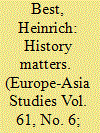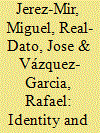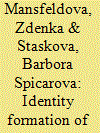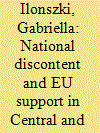| Srl | Item |
| 1 |
ID:
089798


|
|
|
|
|
| Publication |
2009.
|
| Summary/Abstract |
This Essay investigates the pragmatic and symbolic aspects of elites' views about European integration. The pragmatic aspect includes general support for unification and attitudes to supranational redistribution.
|
|
|
|
|
|
|
|
|
|
|
|
|
|
|
|
| 2 |
ID:
089780


|
|
|
|
|
| Publication |
2009.
|
| Summary/Abstract |
Duscussions of Mass,Group, or Collective Identity tend to be characterised by an abundance fo theoretical and conceptual disputes and a relative lack of empirical foundation; in particular there is a lack of comparative studies based on systematic and reliable data (Bruter 2005, pp. 101-09). The dominent paradigm for both sociological and socio-psychological studies of mass identity is the constructivist approach.This emphasises, to varying degrees, the invented and constructed character of mass identity as opposed to essentialist understandings of the concept which assume a unique core or essence of identity(Scott & Marshall 2009, pp.330-33).
|
|
|
|
|
|
|
|
|
|
|
|
|
|
|
|
| 3 |
ID:
089783


|
|
|
|
|
| Publication |
2009.
|
| Summary/Abstract |
European Union Integration and the process of political development and institution building are shaped by interactions between elites and masses. In their initial steps, scholars noted the Predominantly intergovernmental, elite-driven flavour of these processes (Inglehart 1970; Lindberg & Scheingold 1970). It has been during the last few years-as the process of European integration has deepened and the number of 'Europeanised' policy areas has expanded- that national arenas have also been increasingly concerned with European Union (EU) affairs,reinforcing the role of national elites and mass public opinion on European integration (Dalton & Eichenberg 1998).
|
|
|
|
|
|
|
|
|
|
|
|
|
|
|
|
| 4 |
ID:
089794


|
|
|
|
|
| Publication |
2009.
|
| Summary/Abstract |
The European Union (EU) and the concept of creating a new supranational political institution has been going through an unusually dynamic period of development in recent years. It has to do not only with the admission of a large number of new member in a very short period of time, but also with projects designed to deepen integration.
|
|
|
|
|
|
|
|
|
|
|
|
|
|
|
|
| 5 |
ID:
089778


|
|
|
|
|
| Publication |
2009.
|
| Summary/Abstract |
The chapters in this volume give an overview of some research findings fo a European project, called Intune. The project (with the title 'Intune' or 'Int Une', standing for 'Integrated and United? A Quest for Citizenship in an Ever Closer Europe') has been financed by the European Union within the 6th Framework Programme, Priority 7, 'Citizens and Governance in a Knowledge Based Society'.
|
|
|
|
|
|
|
|
|
|
|
|
|
|
|
|
| 6 |
ID:
089788


|
|
|
|
|
| Publication |
2009.
|
| Summary/Abstract |
At the time of the collapse of communism in Central and Eastern Europe (CEE), the political and economic elites (and the majority of the population for that matter) of each of these countries were faced with very different situations, which resulted in different positions vis-a-vis the European Union (EU).
|
|
|
|
|
|
|
|
|
|
|
|
|
|
|
|
| 7 |
ID:
089796


|
|
|
|
|
| Publication |
2009.
|
| Summary/Abstract |
As the European Union (EU) is being constructed increasingly as a political entity more attention is being paid to how its institutional evolution corresponds to national demands.
|
|
|
|
|
|
|
|
|
|
|
|
|
|
|
|
| 8 |
ID:
089785


|
|
|
|
|
| Publication |
2009.
|
| Summary/Abstract |
One of the important constituents of common identity is that the people concerned share a perception of the same external others as threats. Therefore, it may be argued that European identity should be grounded in similar perceptions of threats and that truly European elites should share similar perceptions.
|
|
|
|
|
|
|
|
|
|
|
|
|
|
|
|